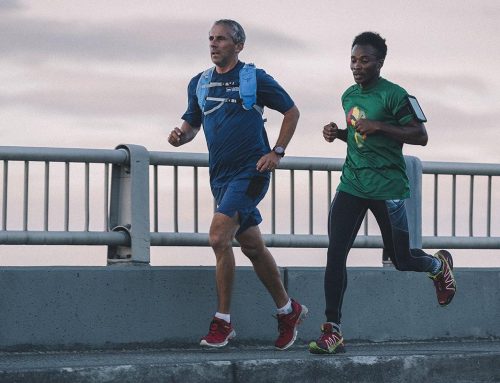Getting fit is like trying to teach a cat to swim: it’s challenging, it’s a bit awkward, and there’s a good chance you might get scratched in the process. But as with any good challenge, success lies in tracking your progress! Measuring your achievements is essential in keeping up the motivation to persevere in your fitness journey. From tummy toning to bicep blasting, we’ll show you how to accurately measure your success (and maybe even avoid a few scratches along the way!). So, buckle up your yoga pants, and let’s dive into the world of tracking achievements in fitness.

Contents
- 1 Tracking Achievements: Measuring Success in Fitness”
- 2 1. Understanding the Importance of Tracking Fitness Goals
- 3 2. The Benefits of Using Technology to Monitor Progress
- 4 3. Setting Realistic Expectations for Success
- 5 4. Evaluating Different Metrics to Measure Success
- 6 5. Using Data to Guide Your Fitness Journey
- 7 The End: Measuring Success in Fitness
Tracking Achievements: Measuring Success in Fitness”
We all have that one friend who never shuts up about their fitness journey. You know the type – the one who posts a gym selfie every day or talks about their meal plan like it’s the most exciting thing in the world. But let’s be real here: we all secretly admire their dedication to health and fitness. And you know what? It’s time to get on that bandwagon. Whether you’re a seasoned gym-goer or a newbie, tracking your achievements is key to measuring success in fitness.
So, what exactly should you be tracking? Here are a few ideas:
– Weight: Duh. This one is pretty obvious. But don’t just focus on the number on the scale. Take measurements of your waist, hips, arms, and legs so you can track inches lost (or gained, if you’re trying to build muscle). And if you’re feeling really fancy, invest in a body fat caliper. Trust us: nothing is more motivating than seeing those numbers go down.
– Performance: How many pushups can you do in a minute? How fast can you run a mile? Can you deadlift your body weight? These are all examples of performance metrics that you can track. Keep a log of your progress and watch as you slowly but surely improve over time. And don’t forget to celebrate the small victories – every rep counts!
– Habits: It’s not all about the physical stuff, folks. Tracking your habits can also be a great way to measure success in fitness. Did you go to the gym five days this week? Did you hit your step goal? Did you eat your vegetables? These habits may seem small, but they add up to big results over time. And don’t worry if you slip up every now and then. We’re all human, and the occasional treat or lazy day won’t undo all your hard work.
In summary, tracking your achievements is crucial to measuring success in fitness. Whether you’re tracking weight, performance, habits, or all of the above, keeping a log of your progress will help motivate you to keep going. So next time that annoying gym friend brags about their latest PR, just smile and say, “That’s great, but have you tracked your vegetable intake lately?” Trust us, they’ll be speechless.

1. Understanding the Importance of Tracking Fitness Goals
Imagine you want to build a house without any blueprint or measuring tape. Sounds silly, right? That’s exactly why tracking your fitness goals is important.
Not only does it give you a clear idea of where you stand, but it also helps you keep track of the progress you’re making (or not). Are you really going to leave your fitness journey up to chance and hope for the best? That’s like playing Russian roulette with your health.
Tracking your fitness goals can be as simple as jotting down your progress in a notebook or using a high-tech fitness tracker. Whatever method you choose, make sure to keep track of important factors like your weight, muscle mass, and body fat percentage. It’s time to stop guessing and start tracking.
- Keep a diary of your workout routine
- Record your meal plans and track the calories consumed
- Measure your progress along the way and make adjustments as necessary
Remember, you’re not just tracking your goals for the sake of it. This information can help you make smarter choices when it comes to your health and fitness goals. Don’t leave your success to chance; take charge of your fitness journey with accurate tracking.
2. The Benefits of Using Technology to Monitor Progress
Who doesn’t love technology? We’re living in a time where we use it for everything from ordering food to finding love. So why not use it to monitor your progress as well? Here are the top reasons why you should:
- It’s easy! No more manual tracking of your progress or having to do mental math. Just pull up an app or use a fitness tracker and voila! You can see exactly how far you’ve come and what you need to work on.
- You can share your progress. Who doesn’t love a good brag? With technology, you can easily share your progress with friends, family, and even strangers on social media. Plus, it’s a great motivator to know others are cheering you on.
And if that wasn’t enough, here’s one more benefit:
- It’s a great excuse to buy more gadgets! “But honey, I need this fitness watch to monitor my progress!” – sound familiar? Don’t worry, we won’t tell anyone it’s just another excuse to add to your gadget collection.
So there you have it, folks. Use technology to monitor your progress and reap the benefits (and maybe add to your gadget collection while you’re at it).
3. Setting Realistic Expectations for Success
We all want to be successful, but sometimes our expectations can get out of hand. Here are some tips for setting realistic expectations:
- Take baby steps – Rome wasn’t built in a day, and neither will your success be. Start small and work your way up.
- Don’t compare yourself to others – It’s easy to get caught up in what others are doing, but everyone moves at their own pace. Focus on your own progress.
- Learn from failure – Failure is inevitable, but it’s also a valuable learning experience. Don’t let it get you down – use it to improve and grow.
Remember, success isn’t just about achieving your goals – it’s also about enjoying the journey. Don’t be so focused on the finish line that you forget to have fun along the way. Keep things in perspective and remember that success is a relative concept.
In the immortal words of Winston Churchill, “Success is not final, failure is not fatal: it is the courage to continue that counts.” So be brave, set realistic expectations, and keep pushing forward – you’ve got this!
4. Evaluating Different Metrics to Measure Success
Now that we’ve established the importance of measuring success, let’s dive into the different metrics we can use to track how well we’re doing. Just like picking a favorite color, there’s no one-size-fits-all approach to this – it really depends on what you’re trying to achieve. Here are some tried and true options to help get you started:
– Unique Views: If you’re all about getting eyes on your content, tracking unique views is a great place to start. Keep in mind though, it’s not just about getting a high number – you want that number to represent the right people. Otherwise, you’ll have the digital equivalent of a ton of window shoppers without anyone making a purchase.
– Conversion Rate: Speaking of purchases, conversion rate is a metrics that measures how many visitors to your page actually take the step you want them to take. Whether it’s making a purchase or signing up for a newsletter, this metric gives you a good sense of how engaged your audience is.
– Social Media Engagement: This one’s a bit trickier to track, but if you have a solid social media presence, it’s worth considering. Likes, shares, and comments can all be a measure of how interested and invested people are in your content. Plus, it’s way more fun than counting page views.
Of course, these are just a few examples – there are plenty of other metrics out there to choose from. The important thing is to be intentional about what you’re measuring and why. Otherwise, you’ll end up like that one person who goes to the gym and just wanders around aimlessly for an hour before leaving feeling vaguely unsatisfied. You don’t want to be that person. Trust us.
5. Using Data to Guide Your Fitness Journey
So, you want to use data to guide your fitness journey? Smart move, friend. With the right tools, you’ll be able to track your progress, analyze your workouts and make smart decisions about your health. What tools, you ask? Let me tell you.
1. Wearables: If you don’t have a smartwatch or fitness tracker, you’re missing out on the easiest way to gather fitness data. You can track your steps, heart rate, calories burned, and even your sleep. Some watches even have GPS, so you can map out your runs or hikes. Plus, it’s a great way to compete with your friends and family for bragging rights.
2. Apps: There are a ton of apps out there that can help you with your fitness goals. Whether you’re looking for a workout plan, nutrition advice, or yoga routines, there’s an app for that. Some of the most popular ones are MyFitnessPal, Strava, and Nike Training Club. Just don’t let your phone tell you what to do – you’re the boss.
3. Charts and Graphs: Okay, I know this sounds boring, but hear me out. Creating charts and graphs to track your progress can be incredibly satisfying. It’s a great way to visualize the goals you’ve achieved and the ones you need to work on. Plus, you can share them on social media and show off your hard work. You’ll never know how satisfying creating a graph can be until you’ve done it.
Now that you’ve got your tools, you’re on your way to becoming a fitness data wizard. But remember, data can only take you so far. It’s still up to you to put in the work and stay committed to your goals. But with a little hard work and a lot of data, there’s nothing you can’t achieve. So go forth, my fitness pal, and conquer the numbers!
The End: Measuring Success in Fitness
Well, folks, we’ve reached the end of our fitness journey. We’ve sweat, we’ve strained, and we’ve probably shed a few tears (mainly when the gym ran out of protein powder), but we’ve made it. Congratulations!
Tracking your fitness achievements can help you stay motivated, learn from your progress, and see how far you’ve come. But remember, there’s more to life than just numbers on a scale or the amount of weight you can lift. The most important achievement is feeling proud of yourself and creating a healthy lifestyle that makes you happy.
So, keep pushing yourself, but also take time to enjoy the journey. Celebrate the small victories, and don’t be too hard on yourself when you stumble. Remember, even the mightiest athletes fall down sometimes (just look at LeBron James!).
And, most importantly, never forget that cheeseburgers still exist. Life’s all about balance, people.
Now, let’s go get some well-deserved ice cream (in moderation, of course).







Leave A Comment